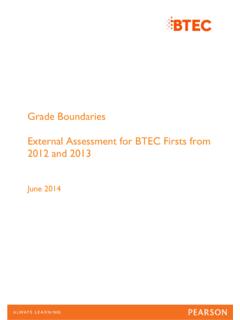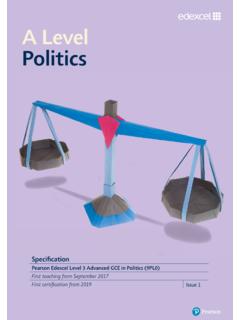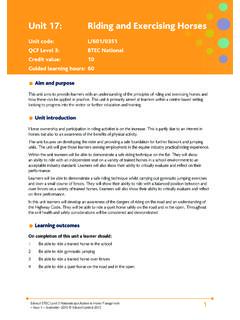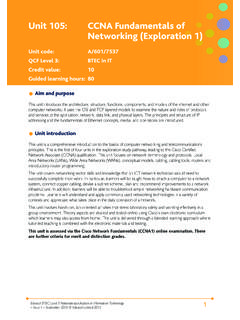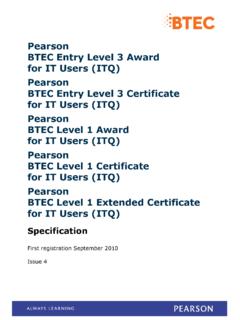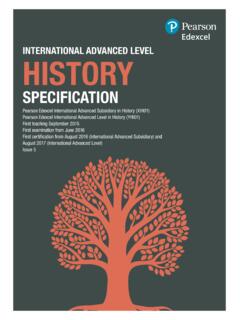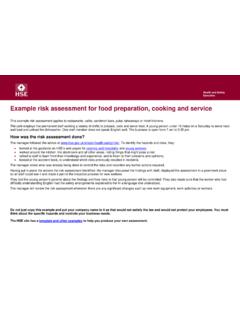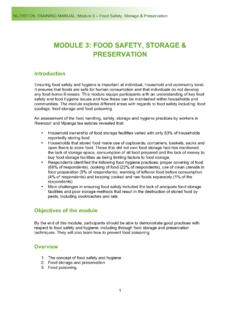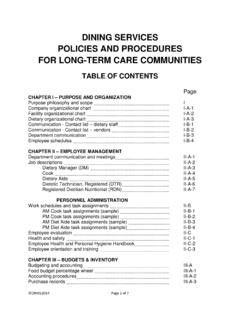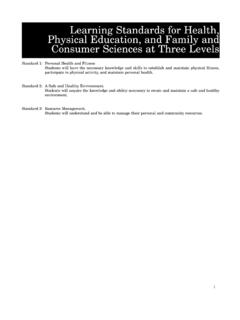Transcription of Unit 38: Supporting Positive Risk Taking for Individuals
1 978 1 446 95317 4 Pearson BTEC Level 3 Diploma in Adult Care (England) Unit Issue 1 January 2018 Pearson Education Limited 2018 1 Unit 38: Supporting Positive Risk Taking for Individuals Unit reference number: L/616/7376 Level: 3 Unit type: Optional Credit value: 4 Guided learning hours: 32 Unit summary Positive risk Taking is a necessary part of life. The aim of this unit is to promote a Positive , person-centred approach to risk Taking for Individuals . The unit emphasises the importance of working in partnership to support Individuals to take risks . In this unit, you will learn about what is needed when an individual wants to take risks that must be supported by their care team. You will gain an understanding of how to balance risk Taking with duty of care, so that Individuals rights are upheld. This unit will also give you the opportunity to reflect on the difficulties and dilemmas commonly encountered when addressing issues of risk and the legal and policy frameworks that apply.
2 978 1 446 95317 4 Pearson BTEC Level 3 Diploma in Adult Care (England) Unit Issue 1 January 2018 Pearson Education Limited 2018 2 Learning outcomes and assessment criteria To pass this unit, the learner needs to demonstrate that they can meet all the learning outcomes for the unit. The assessment criteria outline the requirements the learner is expected to meet to achieve the unit. Learning outcomes Assessment criteria 1 Un derstand the importance of risk Taking in everyday life Explain ways in which risk is an integral part of everyday life Explain why Individuals may have been discouraged or prevented from Taking risks Describe the links between risk Taking and responsibility, empowerment and social inclusion 2 Understand the importance of a Positive , person-centred approach to risk assessment Explain the process of developing a Positive .
3 Person-centred approach to risk assessment Explain how to apply the principles and methods of a person-centred approach to each of the different stages of the process of risk assessment Explain a service-focused approach and a person-centred approach to risk Taking Identify the consequences for Individuals of a service-focused approach to risk assessment 3 Understand the legal and policy framework underpinning an individual s right to make decisions and take risks Explain how legislation, national and local policies and guidance provide a framework for decision making which can support an individual to have control over their own lives Describe how a human rights-based approach supports an individual to make decisions and take risks 978 1 446 95317 4 Pearson BTEC Level 3 Diploma in Adult Care (England) Unit Issue 1 January 2018 Pearson Education Limited 2018 3 Learning outcomes Assessment criteria 4 Be able to support Individuals to make decisions about risks Support an individual to recognise potential risk in different areas of their life Support the individual to balance choices with their own and others health, safety and wellbeing Describe how own values, belief systems and experiences may affect working practice when Supporting an individual to take risks Record all discussions and decisions made relating to Supporting the individual to take risks .
4 Using agreed ways of working 5 Be able to support Individuals to take risks Complete a risk assessment with an individual following agreed ways of working Communicate the content of the risk assessment to others in line with agreed ways of working Support the individual to take the risk for which the assessment has been completed Review and revise the risk assessment with the individual in line with agreed ways of working Evaluate, with the individual, how Taking the identified risk has contributed to their wellbeing 6 Understand duty of care in relation to Supporting Positive risk Taking Explain how the principle of duty of care can be maintained while Supporting Individuals to take risks Explain how to maintain the duty of care if an individual decides to take an unplanned risk 978 1 446 95317 4 Pearson BTEC Level 3 Diploma in Adult Care (England) Unit Issue 1 January 2018 Pearson Education Limited 2018 4 Content What needs to be learned Learning outcome 1: Understand the importance of risk Taking in everyday life Risk Taking in everyday life Individual: someone requiring care or support.
5 risks , using public transport, Taking journeys, managing food preparation equipment, managing cooking equipment, using everyday tools including scissors, cutlery, hairdryers Different areas of their life, health, social, financial, safeguarding young people and vulnerable adults policies. Key aspects of current related legislation. Reasons for preventing risk Taking Protect Individuals from perceived harm. Maintain control. Avoid litigation. Links between risk Taking and responsibility Recognition of consequences of own actions. Taking responsibility for own actions. Links between responsibility and recognition of an individual s chronological age. Links between empowerment and social inclusion Enabling Individuals to belong to society Recognition of citizenship Taking full part in everyday activities 978 1 446 95317 4 Pearson BTEC Level 3 Diploma in Adult Care (England) Unit Issue 1 January 2018 Pearson Education Limited 2018 5 What needs to be learned Learning outcome 2.
6 Understand the importance of a Positive , person-centred approach to risk assessment A person-centred approach to risk assessment Involvement of Individuals and relevant others, family, carers in risk assessment Positive and informed risk Taking Proportionality (management of risk must match gravity of potential harm) Contextualising behaviour Defensible decision making A learning culture Tolerable risks Application of person-centred principles Discuss potential hazards of a proposed activity, with Individuals and relevant others Make decisions on acceptable and nonacceptable risks involved with proposed actions Consider potential harm and ways of managing the risk whilst empowering the individual Discuss why the individual wishes to take the risk Make joint decisions with Individuals and relatives which can be justified if necessary Review the risk following actions and consider any revision for further occasions Discuss future risk Taking with Individuals and relevant others.
7 Differences between service-focused and person-centred approaches to risk assessment Involvement/non-involvement of Individuals and relatives Focus of control, with the service/with the individual A holistic approach/a resource based approach Consequences of a service-focused approach to risk assessment Disempowerment of the individual Control in the hands of the service Individuals with low self-esteem Non-actualisation of the individual 978 1 446 95317 4 Pearson BTEC Level 3 Diploma in Adult Care (England) Unit Issue 1 January 2018 Pearson Education Limited 2018 6 What needs to be learned Learning outcome 3: Understand the legal and policy framework underpinning an individual s right to make decisions and take risks Legislation and policies Valuing People: A New Strategy for Learning Disability for the 21st Century (Department of Health, 2001).
8 Putting People First (Department of Health, 2007). Human Rights Act 1998. Mental Health Act 2007. Mental Capacity Act 2005. Equality Act 2010, safeguarding children and vulnerable adults. Key aspects of current related legislation for England, Wales and Northern Ireland. Human rights-based approach to risk management Responsibility balancing. Advocacy. Direct payments. Personalised services. Person-centred planning, support planning. Learning outcome 4: Be able to support Individuals to make decisions about risks Supporting an individual Use of person-centred risk assessment Discussing choices Use of person-centred thinking Mapping out risks Discussing potential consequences Enabling informed choices Use of illustrated templates, flow charts, information sheets. Technology. The right to make bad decisions. Planning alternatives.
9 Consequences of choice Positive and negative. To the individual. To others. Social, moral, legal. 978 1 446 95317 4 Pearson BTEC Level 3 Diploma in Adult Care (England) Unit Issue 1 January 2018 Pearson Education Limited 2018 7 What needs to be learned Balancing choices Defensible decision making. Contextualising behaviour. Identification of Positive and negative risks . Limited experience Perception and understanding of risk. Task analysis. Perception of the views of others. Others Others, colleagues, families or carers, friends, other professionals, members of the public, advocates. Own values and belief systems Restricting or enabling Importance of placing the individual first Necessity of a non-judgemental approach Importance of not allowing own experiences to impair judgements Reporting and recording Importance and requirements.
10 Accountability and responsibility. Individual and collective. Confidentiality. 978 1 446 95317 4 Pearson BTEC Level 3 Diploma in Adult Care (England) Unit Issue 1 January 2018 Pearson Education Limited 2018 8 What needs to be learned Learning outcome 5: Be able to support Individuals to take risks Risk assessments Process, procedure and format. Recognising valued lifestyle. Identifying risk awareness. Written consent. Reviewing risks Importance and value, progression of individual. Communicating and working with others Shared values. Information sharing. Goals and targets. Multidisciplinary working. Problems with inconsistencies. Agreed ways of working will include policies and procedures where they exist. Confidentiality. Supporting the individual to take the risk Competencies required. Provide support as necessary.
